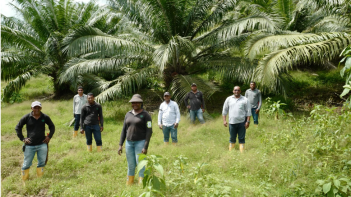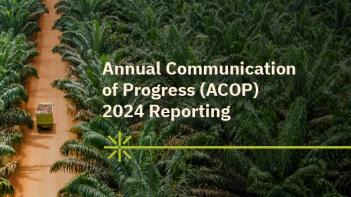RSPO has been actively involved in various initiatives promoting sustainable practices and local community engagement in Nigeria, the largest palm oil producer in Africa. A total of US$300,000 was committed by RSPO in 2022 to boost sustainable palm oil production in Edo State, the country’s highest palm oil producing state that leads production in RSPO Certified Sustainable Palm Oil (CSPO) volumes.
Since kicking off in October 2022, the RSPO Community Outreach programme in Nigeria has commenced various activities with local partner organisation Foremost Development Services (FDS), including baseline surveys and capacity building programmes for local communities and NGOs. The programme is part of a broader initiative to foster closer ties with communities in developing and emerging producer countries.
“RSPO recognises the importance of engaging with local communities affected by palm oil production. We encourage our members and stakeholders to carry out community outreach and engagement programmes as part of their sustainability commitments,” said Imam A. El Marzuq, RSPO Senior Manager, Global Community Outreach and Engagement. “The role of stakeholders in the palm oil supply chain is key in achieving a strengthened, resilient, and prosperous palm oil sector in Nigeria,” said Engr. Rafiat Badmos Rafiat A. Badmos, Technical Consultant, FDS.
Findings of baseline study
The baseline study revealed that the smallholder oil palm production in Edo State was dominated by males within the active and productive age category. The study also showed that the majority of the farmers were literate, with an average oil palm production experience of about 11 years, suggesting that training and dissemination of Best Agricultural Practices and improved technologies would be easily facilitated. The oil palm farmers deriving their livelihoods mainly from oil palm production were independent smallholders who owned their farmlands with average farm size of about 7.88 hectares.
It was further established that the smallholder farmers financed their oil palm production business with personal savings, but different barriers worked against their optimal production, including lack of credit facilities, no support from the government, high costs of agricultural inputs, and lack of knowledge on sustainable palm oil production. Moreover, the majority of respondents had no access to any form of extension services and training, and lacked the means to adopt improved oil palm production technology.
Capacity building: challenges and successes
A number of RSPO Members in the baseline study area, such as Presco Plc and Okomu Oil Palm Company Plc, have already been contributing significantly to the farmers’ production and community development. Member contributions that positively influenced the farmers’ businesses included grading of roads, sales of improved seedlings, and training on oil palm production.
Capacity building activities are now in the programme’s third phase in Edo State. Community training workshops were extended to a wide audience apart from the smallholder farmers, to include community leaders and elders, women, youth and community based organisations.
The initiative encountered its fair share of challenges, including the country’s sociopolitical situation amidst its general elections, fuel scarcity, and the Nigerian currency (naira) redesign policy of the Central Bank of Nigeria. There were also difficulties with communication, owing to inadequate telecommunication signals in some of the communities.
Another challenge was the unwillingness of some communities to attend the training – in Uhunmwode LGA for instance, five communities were invited but only three communities were willing to participate.
Despite these challenges, community workshops targeting Edo State’s five Local Government Areas (LGAs) have been successfully completed in three areas: Ovia Southwest LGA, Ovia Northeast LGA, Uhunmwonde LGA. A total of 11 local community groups that included Indigenous People were engaged, namely Agbanikaka, Gbelegbu, Irhue, Madagbayo, Maroghionba , Odiguetue, Oke, Orhua, Owan, Udo and Uhiere communities.
A number of smallholders expressed their reactions to the workshops, including Benjamin Olowu of the Madagbayo Community, who said, “We never realised how many rights we have because we didn’t have an understanding of the P&C (Principles & Criteria) before now. But today, the knowledge we acquired has made us understand that we have rights that must be respected by any company, new and existing, coming to our area.”
“This training, especially on the FPIC (Free, Prior and Informed Consent) would have come in handy in our dealings with existing companies in our area,” said Peter Akpokona of the Gbelebu Community. “However, we now know better and are positioned on how to relate with any new company coming here.”
Fostering community wellbeing
The RSPO Community Outreach programme was born out of the recognition of the risks associated with oil palm expansion in developing countries. While increased production has led to increased revenue and improved livelihoods for farmers in emerging producer countries, it also risks serious environmental and social impacts, including lack of effective legal protection of the rights of workers, communities and Indigenous Peoples. An improper implementation of Free, Prior and Informed Consent (FPIC) could lead to disputes and community divisions.
Given these challenges, RSPO has recognised the need for more comprehensive outreach efforts in producer countries through a network of intermediaries identified from the related or affected communities.
“RSPO’s Community Outreach Programme helps create avenues of dialogue for us to better understand their needs and concerns, and ensure that the fundamental rights of community members, landowners, plantation workers, small farmers, and their families are respected, which are among the objectives of RSPO’s sustainable palm oil standard,” added Imam.
Keep reading

Call for Expression of Interest: Independent Investigation of a Complaint

Latin American Smallholders, Key Global Brands Gather in Peruvian Amazon to Advance Sustainable Palm Oil

RSPO Forum for Members and Certification Bodies 2025: Strengthening Capacities and Building Bridges with RSPO Members

From Violence to Prosperity: Cultivating Sustainable Palm Oil in San Pablo, Colombia

Palmas de Tumaco: Enduring, Trusting, and Transforming in Colombia’s Pacific Coast
Carry Over Credits for Certified Independent Smallholder Groups

From the Amazon to the Aisles: Discovering Sustainable Palm Oil in the Heart of Peru

Global Trends of Sustainable Palm Oil and China's Pathway




